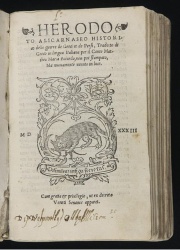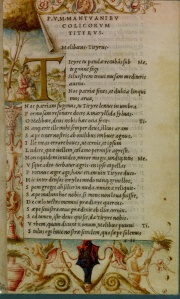Aldine Press
From Textus Receptus
| Line 5: | Line 5: | ||
The press enjoyed a [[Printing patent|monopoly]] of works printed in Greek in the Republic of Venice, effectively giving it copyright protection. Protection outside the Republic was more problematic, however. The firm maintained an agency in Paris, but its commercial success was affected by many counterfeit editions, produced in Lyons and elsewhere. | The press enjoyed a [[Printing patent|monopoly]] of works printed in Greek in the Republic of Venice, effectively giving it copyright protection. Protection outside the Republic was more problematic, however. The firm maintained an agency in Paris, but its commercial success was affected by many counterfeit editions, produced in Lyons and elsewhere. | ||
| + | |||
| + | ==Beginnings== | ||
| + | [[Image:Title page of Herodotus' history of the Greek and Persian Wars 1502.jpg|thumb|right|[[Italian language|Italian]] translation of [[Herodotus' Histories]] by Count [[Matteo Maria Boiardo]], published in [[Venice]], Aldine Press in 1502 (1533?).]] | ||
| + | [[Aldus Manutius]], the founder of the Aldine Press, was originally a humanist scholar and teacher. Manutius met Andrea Torresani, who had acquired publishing equipment from [[Nicolas Jenson|Nicholas Jensen]]'s widow. The Aldine Press was originally owned half by Pier Francesco Barbarigo, the nephew of the current doge of the time, [[Agostino Barbarigo]], and the other half by Andrea Torresani. Manutius owned one fifth of Torresani's share. Manutius mainly was in charge of the scholarship and editing, leaving financial and operating concerns to Barbarigo and Torresani. In 1496, Aldus established his own location in a building called the ''Thermae'' in the [[San Polo|Sestiere di San Polo]]. The building was later demolished in 1873. Manutius lived and worked in the ''Thermae'' to produce published books from the Aldine Press. This was also the location of the "New Academy", where a group of Manutius' friends, associates, and editors came together to translate Greek and Latin texts. | ||
Revision as of 11:00, 23 June 2019
Aldine Press was the printing office started by Aldus Manutius in 1494 in Venice, from which were issued the celebrated Aldine editions of the classics (Latin and Greek masterpieces plus a few more modern works). The first book that was dated and printed under his name appeared in 1495.
The Aldine Press is famous in the history of typography, among other things, for the introduction of italics. The press was the first to issue printed books in the small octavo size, similar to that of a modern paperback, and like that intended for portability and ease of reading. According to Curt Buhler, the press issued 132 books during twenty years of activity under Aldus. After Aldus’ death in 1515 the press was continued by his wife, Maria and her father, Andrea Torresani, until his son, Paulus Manutius (1512–1574) took over. His grandson Aldus Manutius the Younger then ran the firm until his death in 1597. Today, the antique books printed by the Aldine Press in Venice are referred to as Aldines.
The press enjoyed a monopoly of works printed in Greek in the Republic of Venice, effectively giving it copyright protection. Protection outside the Republic was more problematic, however. The firm maintained an agency in Paris, but its commercial success was affected by many counterfeit editions, produced in Lyons and elsewhere.
Beginnings

Aldus Manutius, the founder of the Aldine Press, was originally a humanist scholar and teacher. Manutius met Andrea Torresani, who had acquired publishing equipment from Nicholas Jensen's widow. The Aldine Press was originally owned half by Pier Francesco Barbarigo, the nephew of the current doge of the time, Agostino Barbarigo, and the other half by Andrea Torresani. Manutius owned one fifth of Torresani's share. Manutius mainly was in charge of the scholarship and editing, leaving financial and operating concerns to Barbarigo and Torresani. In 1496, Aldus established his own location in a building called the Thermae in the Sestiere di San Polo. The building was later demolished in 1873. Manutius lived and worked in the Thermae to produce published books from the Aldine Press. This was also the location of the "New Academy", where a group of Manutius' friends, associates, and editors came together to translate Greek and Latin texts.

